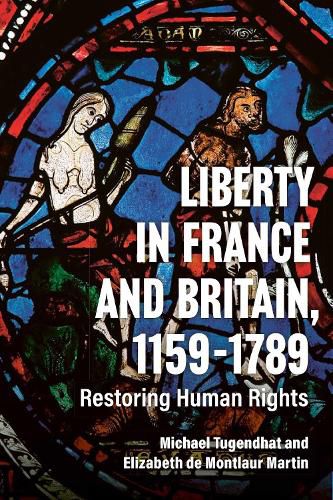Readings Newsletter
Become a Readings Member to make your shopping experience even easier.
Sign in or sign up for free!
You’re not far away from qualifying for FREE standard shipping within Australia
You’ve qualified for FREE standard shipping within Australia
The cart is loading…






Documents the influence Britain and France had on the ideas of liberty and human rights from the twelfth century to the French Revolution.
This book innovatively challenges the widely held perception that the idea of Human Rights and their protection was invented in the long eighteenth century. Liberty, Equality, Fraternity, the motto of the French Republic, encapsulates the 1789 Declaration of the Rights of Man. The authors trace the history of each article in that Declaration to the twelfth to the sixteenth centuries. In that period French-speaking Norman rulers in England introduced the common law based on reason and natural rights, government by limited monarchy and habeas corpus; and in both France and England the right to a fair trial or due process replaced trials by ordeal and battle, chattel slavery disappeared, and the rule of law and republican government were developed. The authors show that the ideas the French and British shared in that period were deployed to justify the rebellions and revolutions in the Netherlands and Britain in the sixteenth and seventeenth centuries, and in France and the USA in the eighteenth century. These ideas inspired human rights declarations, treaties and national laws in the twentieth century. The authors draw on the Policraticus (1159) of John of Salisbury and (among others) Thomas More's Utopia (1516), Jean Bodin's Six Books of the Republic (1576), John Locke's Treatises on Government (c.1689), Montesquieu's Spirit of the Laws (1748) and William Blackstone's Commentaries on the Laws of England (1765-69).
$9.00 standard shipping within Australia
FREE standard shipping within Australia for orders over $100.00
Express & International shipping calculated at checkout
Stock availability can be subject to change without notice. We recommend calling the shop or contacting our online team to check availability of low stock items. Please see our Shopping Online page for more details.
Documents the influence Britain and France had on the ideas of liberty and human rights from the twelfth century to the French Revolution.
This book innovatively challenges the widely held perception that the idea of Human Rights and their protection was invented in the long eighteenth century. Liberty, Equality, Fraternity, the motto of the French Republic, encapsulates the 1789 Declaration of the Rights of Man. The authors trace the history of each article in that Declaration to the twelfth to the sixteenth centuries. In that period French-speaking Norman rulers in England introduced the common law based on reason and natural rights, government by limited monarchy and habeas corpus; and in both France and England the right to a fair trial or due process replaced trials by ordeal and battle, chattel slavery disappeared, and the rule of law and republican government were developed. The authors show that the ideas the French and British shared in that period were deployed to justify the rebellions and revolutions in the Netherlands and Britain in the sixteenth and seventeenth centuries, and in France and the USA in the eighteenth century. These ideas inspired human rights declarations, treaties and national laws in the twentieth century. The authors draw on the Policraticus (1159) of John of Salisbury and (among others) Thomas More's Utopia (1516), Jean Bodin's Six Books of the Republic (1576), John Locke's Treatises on Government (c.1689), Montesquieu's Spirit of the Laws (1748) and William Blackstone's Commentaries on the Laws of England (1765-69).